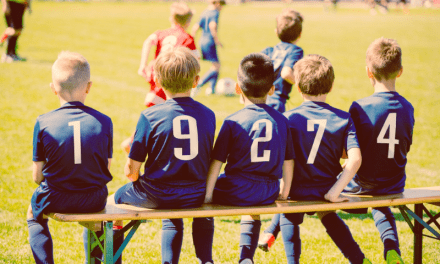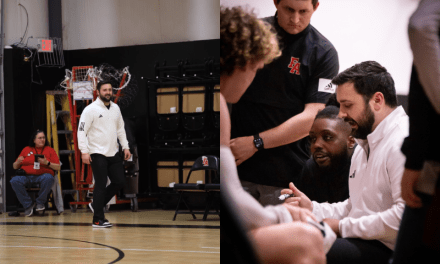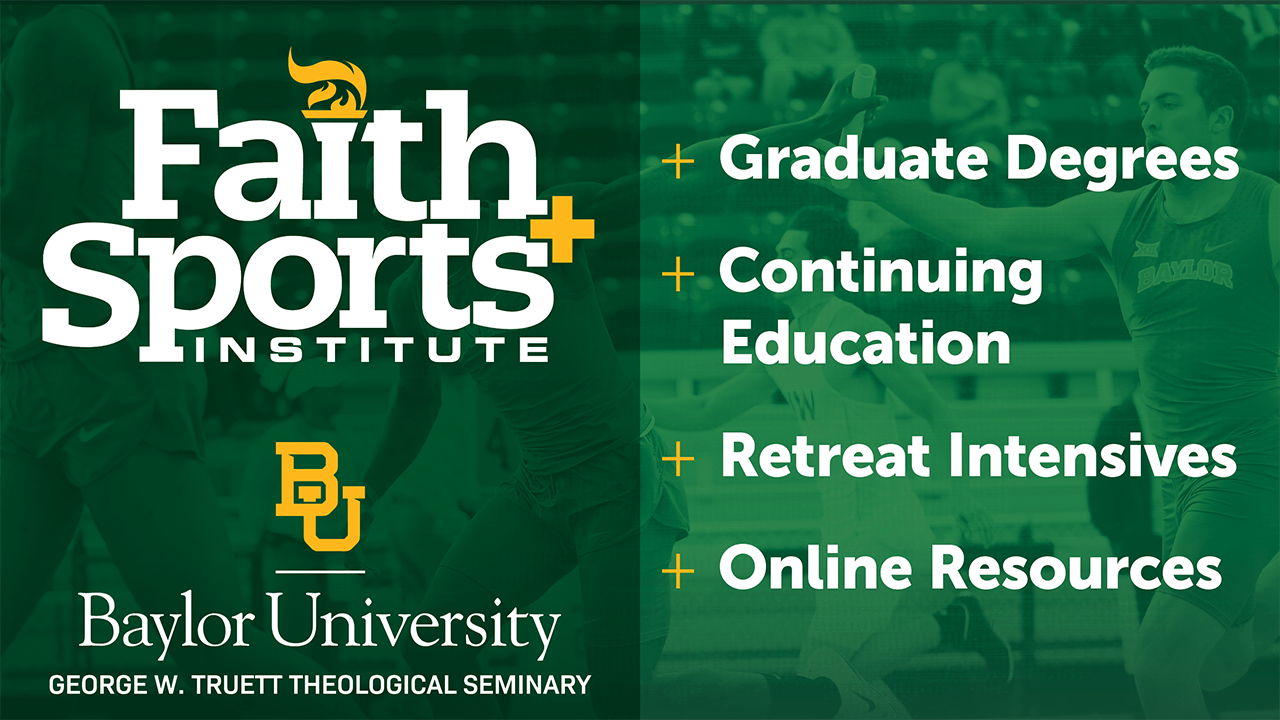Editor’s note: To help Christian sportspeople navigate these uncertain times, we will be publishing a series of posts focused on what it looks like to “Run The Race Well” in a time of coronavirus and quarantine. We will be getting contributions from a variety of perspectives: theologians, philosophers, athletes, coaches, mental health professionals, seminary students, and more. This post comes from David Engbers, athletic director for Holland Christian Schools in Holland, Michigan.
David Engbers
Sports are “the most important of unimportant things.”
I came across that description in Brian Bolt’s book Sport. Faith. Life. But it was not until the recent pandemic that I really experienced the truth of that statement. As a school athletic director, it is painful to put a “pause” on sports in order to fight the virus. But it is necessary. And for those of us in athletics, it offers a chance to reassess and account for our priorities.
Over the past few weeks I’ve had more time than usual for introspection. I’ve been able to think back on my years playing youth sports, coaching school teams, and ultimately making a career in educational athletics. In my reflections I keep returning to a tension that always seems to surface. Does character development or physical development carry more weight? Another way of describing it would be “person vs. athlete” or virtue vs. achievement.” Can we emphasize both or does the struggle between character and physical performance force a choice in educational athletics?
Pursuing Character Development
Let’s start by considering character. Sports are not necessary for character, of course. Our character is part of us before, during, and after competition. Our character is represented by our actions on and off the field and a reflection of who we are in all of life. That said, sports can provide a unique environment to teach, test, and reveal character if we decide it is valuable to do so. The adversity naturally found in competition provides an excellent space to learn the truth that Angela Duckworth articulates in Grit: “As much as talent counts, effort counts twice.”
Regardless of natural abilities, athletes have the potential to grow in perseverance, integrity, and emotional control, to name a few. On teams, they have the opportunity to celebrate the accomplishments of teammates and contribute to a cause greater than themselves. While the life lessons sports can teach may be difficult to learn, coming as they do in intense competitive environments, that difficulty is precisely what makes them so meaningful and lasting.
The importance of character development in sports doesn’t take much convincing.
Pursuing Physical Development
What about physical development? Perhaps we can begin by looking at the importance of the physical through the example of Jesus. In John 21, on the heels of his resurrection, we see Christ communing with his disciples before his ascension. He gives them simple fishing instructions that lead to a net full of fish, and then makes them breakfast over a fire on the beach.
He teaches them, in other words, through the physical.
As an undergraduate physical education student, this message was ingrained in me. I was taught that Christ values our activities and human experience. He demonstrated this by becoming fully human and by the very fact that he created us with physical bodies built to experience life with movement and play. It is no accident that the health benefits of movement are overwhelming. The delight found in the physical is an essential part of who God created us to be.
Competitive sports are an extension of play. Because of this, sports matter. They promote physical development and stretch us to accomplish physical feats far beyond what we considered possible. To celebrate perfectly executed double plays, amazing displays of strength, well-orchestrated fast breaks, and awe-inspiring movements in space is to celebrate human achievement and the beauty brought out by competition.
Yet, tension remains with competition. Naturally built into sports is the goal of winning. And this goal—signified by scoreboards and statistics, championships and titles—dominates our current sports culture. It can lead to unhealthy ways of looking at the world, especially when it comes to the value of human beings. Can you imagine what life would be like if each of us had “fantasy” scores published to establish our worth? And yet too often we assign value to athletes based on performance. This has caused some to counter the entire competitive sports enterprise. Should we engage in sport when it has the potential to distort our values and even our value?
There is nothing wrong with seeking victory, but sports have little depth when the goal of winning is the sole consideration. One helpful way to approach this comes from Todd Gongwer’s influential book, Lead… for God’s Sake! Gongwer encourages athletes to focus on being their best instead of the best. This significant difference allows us to see the value of athletic endeavors regardless of the final result and gives us a posture to view competition. Our physical development is not dependent on being the “greatest of all time,” but on seeking to fulfill our individual and team potential.
Pursuing Physical and Character Development Together
Both physical and character development are worthy goals to pursue in sports. But we haven’t solved the question of emphasis. Should we prioritize one over the other? Or should we emphasize both equally, perhaps devoting half of our time to character development and half to physical development?
As I’ve reflected on this, I’ve come to believe that it is a false choice. Andy Crouch’s book, Strong and Weak, was especially helpful. Crouch masterfully articulates the way human beings can flourish when we allow two seemingly contradictory things to be experienced in fullness together. Crouch focuses on the combination of authority and vulnerability. But we can take the same principle and apply it to the integration of character and physical performance in sports. The fullness of both should and can be emphasized together. We can face the physical challenges in sport and delight in great performances… AND…We can face character challenges in sport and celebrate positive choices. Character and physical development are interdependent and our school sports should reflect this truth.
Pursuing God’s Kingdom Through Sport
Yet, even if character and physical development are good things, neither are pursuits that bring ultimate fulfillment on their own. Viewed through the lens of Christianity, both our character and physical development fall short in sport because of sin. The important step Christians need to take in educational athletics is placing them within the bigger story of what God is doing in the world. We need, in other words, to think of how we might participate in some small way in the redemption of sports culture. In Eternity Is Now In Session, John Ortberg asks the question this way: “What if salvation is not about getting us into heaven, but about getting heaven into us?”
What would it look like to approach sports with this view in mind?
It would start with the recognition that our identity should be grounded in our own unmerited redemption and acknowledgement of God as our Lord and Savior. It would recognize, too, that full redemption of any area of culture is impossible on earth because of our brokenness. Yet, it would seek to provide in sports a taste of the full redemption that is to come. And it would work to align both the character and physical development aspects of school sports inside of God’s redemptive purposes.
When sports return, my hope is that the break will have given us a chance to re-center our priorities and place sports in position as an important “unimportant” thing that conforms to what God is doing in the world. Each of us will fall short in this task, but Christians can press on in joy as God works through our brokenness. As C.S. Lewis puts it in Mere Christianity: “Aim at heaven and you will get earth ‘thrown in’; Aim at earth and you will get neither.” May we humbly aim our best efforts of discipleship-based character and delight-based competition toward God’s kingdom for his glory. We will stumble through this task, but it is exciting grace-filled work!
 About the author: Currently in his 11th year as athletic director for Holland Christian Schools, Dave enjoys serving and growing alongside coaches and student-athletes. He lives in Holland, Michigan, with his wife, Michelle, and four kids: Jackson, Will, Avery and Claire. A graduate of Calvin University, he is a Certified Athletic Administrator through the NIAAA and holds a Master’s Degree in Athletic Administration from Western Michigan University. Prior to his current role, he taught and coached for 8 years at Grand Rapids Christian and Holland Christian Schools. You can follow Dave on twitter @MaroonsAD
About the author: Currently in his 11th year as athletic director for Holland Christian Schools, Dave enjoys serving and growing alongside coaches and student-athletes. He lives in Holland, Michigan, with his wife, Michelle, and four kids: Jackson, Will, Avery and Claire. A graduate of Calvin University, he is a Certified Athletic Administrator through the NIAAA and holds a Master’s Degree in Athletic Administration from Western Michigan University. Prior to his current role, he taught and coached for 8 years at Grand Rapids Christian and Holland Christian Schools. You can follow Dave on twitter @MaroonsAD






